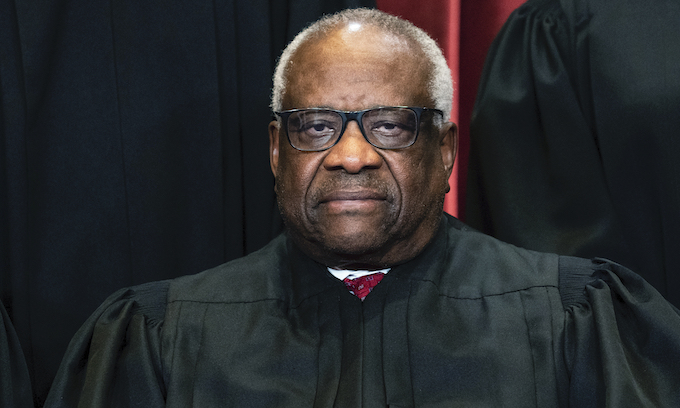Supreme Court Justice Clarence Thomas issued a lengthy, critical dissent in the high court’s ruling that struck down Alabama’s electoral map for congressional elections.
In a 5–4 ruling (pdf) last week, the court found that a map drafted by state Republican lawmakers violated the provisions of the federal Voting Rights Act (VRA) that mandates that states not racially gerrymander districts. The ruling requires the state to adopt a different map before the 2024 elections, which may benefit House Democrats.
Chief Justice John Roberts and Justice Brett Kavanaugh, who were appointed by Republican presidents, joined members of the Supreme Court who were appointed by Democratic presidents in the ruling. Thomas was among four other justices who were appointed by Republicans to disagree with the ruling.
Writing in his dissent, Thomas argued that the Supreme Court’s majority ruling that a section of the 1965 Voting Rights Act that bans gerrymandering based on race is “nothing more than a racial entitlement to roughly proportional control of elective offices—limited only by feasibility—wherever different racial groups consistently prefer different candidates.”
Meanwhile, he added, the Voting Rights Act doesn’t mandate that Alabama “intentionally redraw its longstanding congressional districts so that black voters can control a number of seats roughly proportional to the black share of the State’s population.”
“At the outset, I would resolve these cases in a way that would not require the Federal Judiciary to decide the correct racial apportionment of Alabama’s congressional seats,” Thomas further stated.
“The majority goes to great lengths … to fossilize all of the worst aspects of our long-deplorable vote-dilution jurisprudence,” Thomas also wrote, adding that “it virtually ignores Alabama’s primary argument—that, whatever the benchmark is, it must be race neutral—choosing, instead, to quixotically joust with an imaginary adversary.”
The Majority Ruling
Writing for the majority, Roberts argued that the Supreme Court disagreed with Alabama lawyers’ position on Section 2 of the Voting Rights Act.
“We are content to reject Alabama’s invitation to change existing law,” the chief justice wrote. “We find Alabama’s new approach to [Section] 2 compelling neither in theory nor in practice. We accordingly decline to recast our [Section] 2 case law as Alabama requests.”
He also noted that there are concerns about Section 2 that “may impermissibly elevate race in the allocation of political power within the States,” adding that “racial gerrymandering, even for remedial purposes, may balkanize us into competing racial factions; it threatens to carry us further from the goal of a political system in which race no longer matters.”
“Under the Court’s precedents, a district is not equally open when minority voters face—unlike their majority peers—bloc voting along racial lines, arising against the backdrop of substantial racial discrimination within the State, that renders a minority vote unequal to a vote by a nonminority voter,” Roberts wrote.
Kavanaugh wrote that a proceeding case helped determine that Alabama’s arguments were incorrect.
“But as this court has long recognized—and as all Members of this Court today agree—the text of [Section] 2 establishes an effects test, not an intent test,” Kavanaugh wrote. “And the effects test … requires certain circumstances that courts account for the race of voters so as to prevent the cracking or packing—whether intentional or not—of large and geographically compact minority populations.”
Evan Milligan, a black voter and the lead plaintiff in the case, said the ruling was a victory for “democracy” and African-Americans. “We are grateful that the Supreme Court upheld what we knew to be true: that everyone deserves to have their vote matter and their voice heard. Today is a win for democracy and freedom not just in Alabama but across the United States,” Milligan said in a statement.
Alabama Republican Party Chairman John Wahl wrote in a statement that state lawmakers would comply with the ruling. “Regardless of our disagreement with the Court’s decision, we are confident the Alabama Legislature will redraw district lines that ensure the people of Alabama are represented by members who share their beliefs, while following the requirements of applicable law,” Wahl said.
Steve Marshall, the state’s attorney general, said he expects to continue defending the challenged map in federal court, including at a full trial. “Although the majority’s decision is disappointing, this case is not over,” Marshall said in a statement.
Separately, the Supreme Court in the fall will hear South Carolina’s appeal of a lower-court ruling that found Republican lawmakers allegedly stripped black voters from a district to make it safer for a Republican candidate. That case also could lead to a redrawn map in South Carolina, where six U.S. House members are Republicans and one is a Democrat.
The Associated Press contributed to this report.



















Fools, both Kavenaugh and Thomas, on this one.
DEMS FOR YEARS< have been redrawing maps to SUIT THEIR NEEDS and screw conservatives over.. BUT NEVER GET challenged in courts on it.
BIUT when the GOP does it, "RRAAAAACCCCCCCIIIIIIIISSSSSSSSMMMMMMMM"….